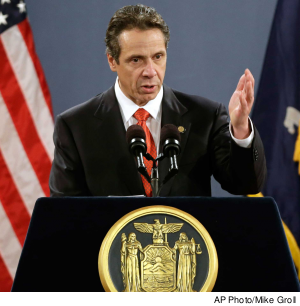In his proposed state budget for next year, released on January 22, Governor Andrew Cuomo offers relatively flat state funding for CUNY, and continues to depend on increased tuition to cover most increases in CUNY expenses. With CUNY still feeling the effects of a generation of disinvestment, PSC leaders responded that more state support is needed. The union also voiced concerns about proposed new programs that would tie workforce development funding to “performance measures” and to a greater role for private industry in public higher education.
 |
Under Cuomo’s plan, state aid for CUNY senior colleges is roughly flat except for an additional $35 million to cover mandatory cost increases in fringe benefits. But some other increases in mandatory costs are not covered. For example, CUNY’s requests for $9 million to pay for higher energy expenses and $3 million to $4 million for increased building rental costs were not included. Revenue from the annual senior college tuition hike of $300 would cover an additional authorization of $61 million for other spending increases.
‘Harmful’
“The PSC opposes annual tuition hikes as a funding strategy,” said the union’s first vice president, Steve London. “The tuition increases have harmful effects on college access because they are not offset by increased financial aid for many students. Importantly, to provide the true funding needs of CUNY through tuition dollars would bankrupt students.”
Proposed per capita base aid from the State to CUNY’s community colleges aid is also flat, at $2,727 per full-time equivalent student, but total spending on community college base aid would go up a bit, due to increased enrollment since last year’s state budget was passed.
Beyond these basic elements of CUNY funding, Cuomo’s proposed budget for 2013-2014 included some new programs designed in ways that the PSC said were troubling. “The Governor’s budget address put a major focus on community colleges’ workforce development roles to the exclusion of their other important missions, and would give private industry a worrisome amount of influence over certain community college degree programs,” London said.
A new “Next Generation NY Job Linkage Program” would require that all credit-bearing certificate programs, and all AAS and AOS degree programs, be linked closely with local industry as a prerequisite for receiving public funding. The job linkage program would also make available to CUNY a $2-million “performance-based” incentive award based on “student success measures.”
This narrow focus would set a dangerous precedent, London said, and leaves important questions unanswered. CUNY has in the past made some important missteps when it tried to tie its programs too closely to short-term job market trends. For example, City College closed its School of Nursing in the mid-1990s, shortly before the advent of a major nursing shortage.
The executive budget proposal would also devote $55 million to a new “NYCUNY 2020” competitive grant program, modeled after a SUNY program that began two years ago. “Projects will be selected in a competitive manner, based on economic impact, advancement of academic goals, innovation and collaboration,” the Division of Budget said. The statement said NYCUNY 2020 will serve as a regional economic development initiative, but gave few other details.
PSC members will be working to influence final decisions on the state budget by meeting with legislators in Albany and in their local district offices in NYC. Goals include restoration of funding for key programs like campus-based child care. “For Albany to make the right decisions on CUNY’s budget, lawmakers need to hear firsthand about working and learning conditions at our University,” said PSC President Barbara Bowen. This year’s “spring advocacy calendar” has changed to put a greater emphasis on visits to legislators in their local district offices.
Get Involved
If you would like to join in one or more of these events, you can sign up online:
• In-District Meetings in NYC – Feb. 7-8
• NYSUT Committee of 100 Advocacy Day, Albany – Mar. 4-5
• NYSUT Higher Education Advocacy Day, Albany – Mar. 11-12
• Student/Faculty/Staff Higher Ed Action Day, Albany – Mar. 12
• Other In-District Meeting dates in NYC to be announced
Transportation, food and hotel costs for the March 4-5 and March 11-12 Albany trips are covered by the PSC’s state affiliate, NY State United Teachers. Members can also ride back and forth to Albany with students on the buses for the Mar. 12 day. If you have questions, contact Amanda Magalhaes in the PSC office, or call 212-354-1252).

